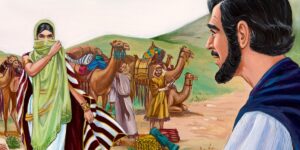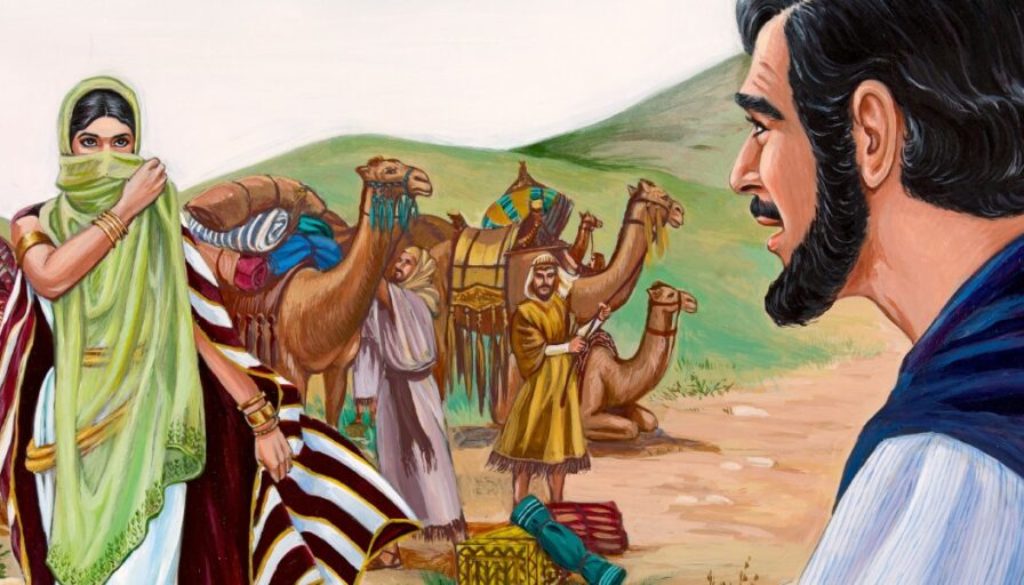Genesis 24:1-67 Paved the Way

The time has come for Isaac to take a wife. But Abraham has specific orders as to who that wife will be. She is not to be one of the Canaanites living in the land around them but one of his own relatives.
I LOVE this story! My favorite stories are ones where you “can see the finger of God writing it” as you go along. This is one such story. From beginning to end, You see God’s hand in all of it. Let’s see where His hand takes us with it today.
I was curious about the way Abraham told his servant to make this solemn oath to him. I the United States, where I live, we make promises on handshakes, signed pieces of paper, a hand lifted in the air, or sometimes even on the bible. I don’t know what other culture do for this practice. I went to my favorite answer site to learn the meaning of this practice. Once again Got Questions gave me some helpful insight. Here is a link to check out their answer on this issue.
Something I noticed about this promise was that the servant was given a choice. He was given the opportunity to hear the request entirely and then decide if he could abide by the conditions. As a servant he was required to do his master’s bidding, weather he agreed with him or not. But Abraham didn’t rely on this relationship to make his request. He wanted his servant’s personal commitment to this task. Abraham allowed for questions and conditions before the final “swearing in ceremony.” That final commitment was as binding a promise as could be and Abraham’s servant entered into it of his own accord. And that decision was based on respect for Abraham and faith that Abraham’s God wouldn’t let Abraham down.
Abraham’s servant was the oldest one in his household. Abraham had a longstanding relationship with him. He trusted him to follow instructions. Part of their relationship was the servant watching how Abraham interacted with God.
He watched Abraham seek God for answers to his troubles. He saw God fill Abraham’s coffers. He was circumcised by Abraham’s hand to be part of his covenant with God. He may have even been one of the men taken along with Abraham and Isaac on their sacrificial journey to Mt. Moriah. I would love to hear the stories around the campsite on the way home from that journey. I imagine he was Abraham’s closest confidant, besides Sarah. She was gone and this servant was what remained.
After being commissioned, Abraham’s servant made special preparations. He loaded ten camels with all manner of gifts. He picked out reputable people to join him on his journey. And he traveled precisely where Abraham told him to go.
Once he arrived we get to see firsthand the “fingerprints” of God in action. Step by step by step God led the way. Something that saddens me in this section of the story though is that Abraham’s servant prayed to God through Abraham. He called God “the God of my master. He didn’t presume to suppose that God would answer his prayers on his own merits. He did ask for God to move on his behalf but his master’s. Through circumcision he was a part of Abraham’s covenant with God but every blessing and answered prayer was received under the umbrella of Abraham’s relationship, not the individual’s.
As we saw earlier, this servant knew Abraham’s God through Abraham. He had learned to ask God for his needs by watching Abraham do that very thing. So he knew how to make his requests made known.
“O Lord, God of my master Abraham, please grant me success today and show steadfast love to my master Abraham” (verse 12). He then laid out EXACTLY how he needed God to move to let him know which maiden He had chosen for Isaac. He hadn’t learned to hear the voice of God speaking directly to him like Abraham had but he had certainly learned how to lay out his requests precisely enough that he couldn’t mistake the hand of God in action.
And God answered that request even before he finished speaking it. This means that God KNEW the time he would arrive at the well. God KNEW the conditions he would make. God KNEW when to send the right woman to the well. And God orchestrated her upbringing to train her in kindness to others.
This was the time of day that all the village women came to draw water. Any one of them could have come at that time. Or even a group of them could have arrived. But they didn’t. Only the ONE woman God had chosen showed up and she fulfilled EVERY requirement of the servant’s prayer.
Abraham’s servant is overjoyed but restrained as he watches Rebekah meet his prayer request parameters. Her actions alone don’t make her the choice for Isaac’s bride. But her answers to his question bring her a GIANT step closer. For this woman is indeed Abraham’s kinsman and she had the gift of hospitality.
After all the camels are watered and her identity is established, it is time to reveal his mission. Rebekah is so excited by the story of the servant that she “ran and told her mother’s household about these things” (verse 28).
I like that Abraham’s servant finally realizes that God was working on his behalf too; not just Abraham’s. “As for me, the Lord has led me in the way to the house of my master’s kinsmen” (verse 27). He didn’t have a map with “X marks the spot” to lead him here. He had a name and a last known location to work with. God did the rest and the servant gave Him the credit for doing just that.
Rebekah’s brother Laban got “gold dust in his eyes” when he saw the gifts already given to his sister. That “gold dust” would turn into even bigger problems later on, but that’s for another time. He is more than happy to have this stranger stay with them for a while. “Who knows what we may eventually get out of him!”
Through all the “hubbub” Abraham’s servant remains focused on his promise. He refuses to even sit down and eat until he discloses his purpose to those in attendance. He lays out the whole story for them by beginning with Abraham’s wealth, moves to the conditions attached to the promise, lays out his prayer request and Rebekah’s fulfillment of that promise and concludes with turning his worshiping God for all He had done to make this happen. Finally, he had to know the answer to his quest before dinner would be consumed.
I have a question here. Why did Laban join in on giving the answer? Bethuel is Rebekah’s father, not Laban. Is it because of the “gold dust” issue I mentioned earlier? Or did the brother have to give consent too in the case of marriage? Their answer is right on point though.
“The thing has come from the Lord; we cannot speak to you bad of good. Behold, Rebekah is before you; take her and go, and let her be the wife of your master’s son, as the Lord has spoken” (verses 50-51). They recognized God’s hand at work and His preeminence over all things. THAT was the RIGHT answer.
“Gold dust fever” strikes again when Abraham’s servant presents his gifts to Laban and Rebekah’s mother. They want to keep her AT LEAST another ten days before letting her go. Did they think they there would be more gifts if they stayed longer? It didn’t work that way. It was a now or never proposition being offered. I’m glad to see that Rebekah didn’t see it their way. She was ready to go!
Making a long story even longer, it was love at first sight for Rebekah and Isaac. There wasn’t a long drawn out courtship either. They married quickly and both were happy, for a while.
Father God, thank You that I can see Your fingerprints in my life in several areas. I love looking back at Your faithfulness. Even when I’m not so faithful, You always are!
Thank You too Father that we have a personal relationship. No longer do I have to receive my privilege of access to Your presence through another human being. I can come boldly before You. I still have ONE advocate, who is Jesus Christ, but I can come to You with my personal issues and KNOW that You hear me. I have a direct line to Your grace and mercy. No longer does our relationship look like a “string art” picture but a dog trail that has been run so many times the grass has died out ages ago. Keep me coming so that path NEVER gets overgrown again!




